The backlog of skilled worker visas is a “hopeless situation”, but the government is working as fast as it can to get them processed, the prime minister says.
As businesses across multiple industries indicate they’re being hampered by skills shortages, it’s estimated more than 100,000 overseas workers remain for visa processing.





